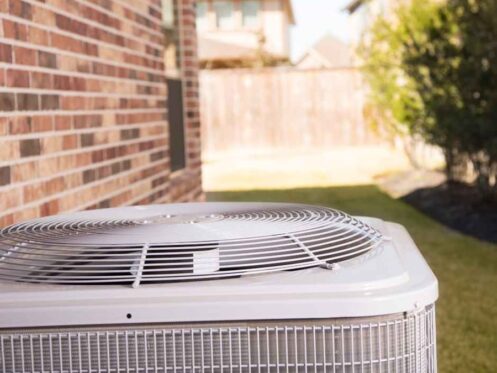Whether it’s keeping your home cozy during a Pennsylvania snowstorm or cool during a summer heatwave, your HVAC system is the unsung hero of home comfort. In Delaware and Philadelphia Counties, where seasonal temperature swings are the norm, your heating and cooling system works overtime to keep conditions just right.
Unfortunately, many homeowners don’t think about their HVAC system until something goes wrong—and by then, they’re facing expensive repairs or uncomfortable downtime. The truth is, with the right care and expert support, you can extend your system’s life, improve your indoor air quality, and keep your utility bills in check.
From understanding how your system works to knowing what to expect during a replacement, being informed is your first line of defense against costly surprises. Preventive maintenance and smart upgrades aren’t just for the pros; any homeowner can benefit from knowing what to look for and when to act.
In this comprehensive blog, we’ll walk you through key HVAC concepts, seasonal maintenance tips, signs it’s time for service, and best practices for new installations. Whether you’re a first-time buyer or a longtime homeowner, these insights will help you make smarter, more confident decisions.
Understanding Your HVAC System Basics
Every homeowner relies on their HVAC system, but not everyone understands what it really does or how to get the most from it. Knowing the fundamentals of your heating, ventilation, and air conditioning setup helps you maintain it properly, recognize issues early, and make informed decisions about repairs or upgrades.
What HVAC Stands For (and What It Includes)
HVAC stands for Heating, Ventilation, and Air Conditioning. It’s not just one system—it’s a collection of components that work together to regulate temperature, humidity, and air circulation in your home.
In Delaware and Philadelphia County homes, the most common systems include:
-
Central air conditioning systems: These use an outdoor compressor and indoor air handler to distribute cooled air through ductwork.
-
Furnaces: Typically gas- or electric-powered, furnaces heat air and push it through the duct system to warm your home.
-
Heat pumps: These versatile systems can both heat and cool your home by transferring heat rather than generating it.
-
Ductless mini-splits: Great for additions or older homes, these provide zone-specific heating and cooling without ducts.
Understanding which system your home uses—and how old it is—gives you a starting point for care and upgrades.
HVAC’s Role in Energy Efficiency and Comfort
A well-maintained HVAC system does more than control the temperature. It impacts your energy bills, your air quality, and even your health. Systems that are clean, well-calibrated, and appropriately sized will run more efficiently, keeping you comfortable with less waste.
Consider upgrades like:
-
Smart thermostats, which allow for scheduling, zoning, and remote access for better energy control.
-
Zoned HVAC systems, which let you heat or cool specific areas of your home rather than the whole house.
These features reduce strain on your system and help lower your utility bills—especially during the hottest and coldest months.
Seasonal HVAC Maintenance Tips for Homeowners
Staying on top of seasonal HVAC maintenance is one of the most effective ways to improve system efficiency, extend equipment lifespan, and prevent costly breakdowns. Regular checkups keep your system running smoothly through Delaware and Philadelphia County’s changing weather and reduce the risk of last-minute emergencies when you need heating or cooling the most.
Spring and Summer AC Care
As temperatures rise, your air conditioner takes center stage. Getting it ready before the heat sets in ensures reliable cooling when it counts.
Here’s what to do in the spring:
- Replace your air filter: Dirty filters restrict airflow, making your system work harder and reducing efficiency.
-
Clean the outdoor condenser unit: Remove leaves, twigs, and debris around the unit. Gently hose down the coils for better heat transfer.
-
Check refrigerant lines and insulation: Exposed or cracked insulation should be replaced to keep energy usage low.
-
Test the system early: Don’t wait for a 90-degree day—run your AC in early spring to confirm it’s cooling properly.
-
Schedule professional service: An annual tune-up can catch issues like refrigerant leaks, faulty capacitors, or electrical problems before they cause a breakdown.
Fall and Winter Heating Readiness
Your furnace or heat pump works hardest during the coldest months. Make sure it’s up for the job with these fall maintenance tasks:
-
Inspect the thermostat: Make sure it’s calibrated and functioning properly. A smart thermostat can also be programmed for energy savings.
-
Replace or clean filters: As with cooling season, clean filters are essential for airflow and system protection.
-
Have the heat exchanger inspected: Cracks or damage can pose serious safety risks like carbon monoxide leaks.
-
Test carbon monoxide detectors: These are essential when heating systems are in use. Replace batteries and test function every fall.
-
Book a professional furnace inspection: Technicians can clean burners, check ignition components, and ensure your system runs safely and efficiently.
Keeping your HVAC system on a seasonal maintenance schedule is one of the smartest things you can do as a homeowner—and it’s often required to maintain manufacturer warranties.
Warning Signs You Need HVAC Repair or Replacement
Even with regular maintenance, every HVAC system will eventually need repairs—or reach the end of its lifespan. Catching warning signs early can prevent sudden breakdowns and help you avoid pouring money into a system that’s no longer worth fixing. Whether it’s a strange noise or a spike in your utility bill, knowing what to look for makes all the difference.
When Repairs Are Worth It
Some HVAC issues are minor and easily resolved with the help of a professional. If your system is under 10 years old and hasn’t had ongoing problems, repairs are often the right choice.
Signs your system likely just needs repair include:
-
Odd noises like buzzing, rattling, or squealing
-
Inconsistent temperatures in different rooms
-
Weak airflow from vents
-
Sudden increase in energy bills without lifestyle changes
-
Short cycling, where the system turns on and off frequently
These symptoms could point to common issues such as a failing capacitor, dirty coils, or a malfunctioning thermostat. Most are cost-effective to fix—especially if addressed early.
When It’s Time to Replace the System
In some cases, it’s more economical and energy-efficient to replace the system altogether. If your HVAC unit is nearing the end of its expected lifespan—or if repair costs are stacking up—replacement may be the smarter investment.
Consider replacing if:
-
Your system is 10–15 years old or older
-
You’ve had multiple repairs in the last few years
-
Your home still uses R-22 refrigerant, which is no longer manufactured
-
You want to upgrade for energy efficiency, smart features, or better comfort
-
You’re experiencing poor airflow or frequent breakdowns
Today’s high-efficiency systems offer major improvements in performance and cost savings. A new unit may even pay for itself over time through reduced energy usage.
What to Expect With a Professional HVAC Installation
Whether you’re replacing an outdated system or installing HVAC in a newly purchased home, a professional installation is key to long-term comfort, safety, and energy efficiency. Cutting corners or working with underqualified installers can lead to problems that cost more in the long run. Here’s what to expect when you schedule a proper HVAC installation in Delaware or Philadelphia County.
Sizing and Load Calculations Matter
One of the most critical aspects of a successful HVAC installation is proper system sizing. An HVAC unit that’s too large will short cycle—turning on and off too frequently—which causes unnecessary wear and inconsistent temperatures. On the other hand, an undersized system won’t be able to keep up, leaving your home uncomfortable during extreme weather.
Reputable contractors perform a Manual J load calculation, which evaluates your home’s square footage, insulation levels, window efficiency, and local climate to determine the ideal system size. Don’t settle for guesswork—a properly sized system ensures maximum comfort and long-term performance.
The Installation Process and Timeline
A typical HVAC installation takes one full day for most residential systems, though more complex projects may require extra time. The process generally includes:
-
Removing the old equipment safely and disposing of it properly
-
Inspecting and adjusting ductwork for compatibility, air balance, and cleanliness
-
Installing the new unit, thermostat, and any accessories (like air purifiers or humidifiers)
-
Connecting refrigerant lines, electrical wiring, and condensate drains
-
Testing the system thoroughly to ensure safe, efficient operation
-
Walking you through system settings and answering any questions
After the installation, you should receive warranty details, a service record, and tips for maximizing your system’s efficiency.
Choosing the Right HVAC Partner in Delaware & Philadelphia Counties
With so many contractors available, selecting the right HVAC professional for your home can feel overwhelming. But choosing a trusted, experienced team makes all the difference—not just during installation, but for years of maintenance, repairs, and support to come.
Look for Licensing, Insurance, and Credentials
First and foremost, always work with a licensed and insured HVAC contractor. Licensing ensures the team meets Pennsylvania’s requirements for technical knowledge, while insurance protects both you and the workers in case of an accident or damage.
You should also ask about certifications, such as:
-
NATE (North American Technician Excellence) certification
-
EPA certification for refrigerant handling
-
Factory-trained technicians for your specific equipment brand
These credentials demonstrate that your HVAC team stays up to date with the latest systems, codes, and technologies.
Evaluate Estimates and Service Guarantees
A reputable HVAC company will provide a detailed, written estimate, not just a ballpark number. The quote should break down equipment costs, labor, warranty coverage, and any additional fees.
Also look for strong service guarantees or maintenance plans. These show the company stands behind its work and is committed to long-term customer care.
The Dream Team Difference
At Dream Team Plumbing, Heating, Cooling & Electrical, we take pride in offering honest recommendations, transparent pricing, and expert craftsmanship. Our licensed technicians are local to Delaware and Philadelphia Counties, which means we understand the unique needs of homes in this region—from older row houses to new builds.
Whether you’re planning a system upgrade or need emergency HVAC service, our goal is to deliver reliable, efficient comfort with every call.
Stay Comfortable With Smart HVAC Decisions
Your HVAC system plays a crucial role in keeping your home comfortable, healthy, and energy efficient throughout the seasons. From understanding how your system works to recognizing when it’s time for maintenance, repair, or replacement, proactive care makes a measurable difference in your comfort and costs.
Whether you’re dealing with aging equipment, planning a new installation, or simply trying to prevent surprise breakdowns, working with a knowledgeable, trustworthy HVAC team is key. The right partner will help you navigate your options, protect your investment, and ensure your system performs at its best—year-round.
At Dream Team Plumbing, Heating, Cooling & Electrical, we make HVAC services easy, transparent, and reliable for homeowners across Delaware and Philadelphia Counties. From routine tune-ups to energy-efficient installations, we’re here to deliver solutions that keep your home running smoothly.
Contact Dream Team Plumbing, Heating, Cooling & Electrical today to schedule your HVAC service and enjoy expert care you can count on.



